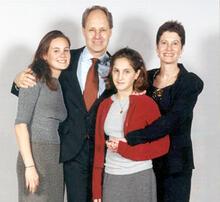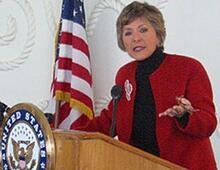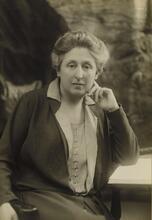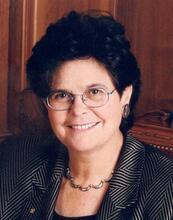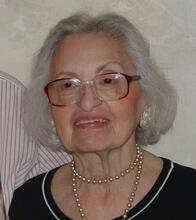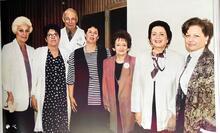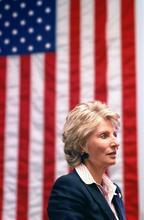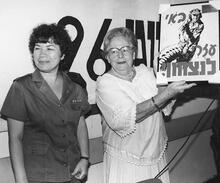Meyera Oberndorf
She was told there were three things that would keep her from succeeding: she was female, she was short, and she was Jewish. Meyera Oberndorf proved her naysayers wrong by becoming the first female and first Jewish mayor of Virginia Beach. From 1988 to 2008, she took on a good old boy network, stood in the glare of the national spotlight during racial unrest, and shared her personal battles with breast cancer and Alzheimer’s. Her leadership of Virginia’s largest city earned the respect of fellow politicians, the love of citizens who elected her for five consecutive terms, and the acclaim of Newsweek as one of the nation’s top mayors.
Meyera Oberndorf blazed trails in Virginia politics as the first female and first Jewish mayor of Virginia Beach, the largest city in the Commonwealth. She served five terms as mayor, being re-elected from 1988 to 2008. Her ascendance in political life mirrored the national movement for women’s rights in the 1960s and 1970s. She spent decades challenging the norms of a long-ingrained male-run political system in a city dominated in the national spotlight by Pat Robertson, chair of the conservative Christian Broadcast Network (CBN). Oberndorf was known as the “people’s mayor,” remaining true to her grassroots politics and publicly sharing her personal struggles with breast cancer and Alzheimer’s, all while keeping her Jewish identity and values front and center.
Family and Education
The only child of Louis and Hilda Ellenson, Meyera Fran Ellenson was born in Newport News, VA, on February 10, 1941. Louis was a prominent criminal attorney and Hilda was a pharmacist. Oberndorf’s paternal grandparents, Harry and Mary Ellenson, had immigrated from eastern Europe to Virginia at the beginning of the twentieth century. Harry and Mary had five children, all of whom lived in the East End of Newport News. So while Oberndorf had no siblings, she was raised in an extensive web of familial relations in the Christopher Shores neighborhood. Her first cousin, David Ellenson, remembers Oberndorf well as the “older sibling” he could turn to for advice, support, and fun. In an Orthodox home, mother Hilda was especially observant, and she instilled in her daughter a lifelong love of and commitment to traditional Judaism.
When it came time for college, Oberndorf’s parents wanted her to pursue an Orthodox education, and she attended Stern College for Women in New York. There she met her future husband, Roger Lee Oberndorf, at a mixer she attended with her cousin. Meyera and Roger were married in 1961, and the couple moved south to the Virginia Peninsula, where Roger attend the U.S. Coast Guard's Officer Candidate School in Yorktown. Oberndorf finished her education closer to home at the College of William & Mary and Old Dominion University, graduating with a B.A. in Elementary Education in 1964.
Entering Civic and Political Life
The Oberndorfs set up their first home in Virginia Beach, a newly incorporated, fast-growing city in the Commonwealth’s Hampton Roads region. The couple welcomed two daughters, Marcie (b. 1966) and Heide (b. 1969). Oberndorf soon realized that a career as a teacher was not for her. She found her real passion elsewhere. In a 2003 interview in Lilith magazine with journalist Ruth Andrew Ellenson, who is Oberndorf’s second cousin, the mayor recounted the genesis of her civic life, which occurred when she and a group of fellow housewives invited school officials to their homes to voice concerns. They donned their finest dresses and put out the silver, as Southern ladies were expected to do. Then Oberndorf found herself needing to take the (white) gloves off! “I was stunned when these women, who complained so bitterly to me about the state of our school, sat there in silence when the men showed up,” she remembered. “I decided right there it was up to me to speak for the group. And I never stopped!”
That said, like many women of her generation, Oberndorf wrestled with internal doubts about venturing into “unladylike” territory. Her mother, to whom she was devoted, died of breast cancer in 1967. While devastating, Hilda’s death also opened a new chapter in Oberndorf’s life. “When I initially told my mother I was thinking about running for public office, she told me to bite my tongue,” Oberndorf explained. “She said that the women who went into politics were not her idea of what a lady should be. I always wanted her approval, so if she had lived, I probably would never have run.”
But run she did. Public service began in earnest with Oberndorf’s appointment to the Virginia Beach Public Library Board. Her work resulted in the transformation of the city’s fledgling and underfunded library program into a civic priority and a point of local pride. In the national employee magazine published by the Ford Motor Company, where Roger worked as an engineer at the Norfolk plant, the cover story gave Oberndorf kudos but also a subservient moniker typical of the era. The headline: “Ford wife battles library board – and wins.”
Battling Sexism and Anti-Semitism
Politics turned into a family affair for the Oberndorfs, with Meyera as the leader and Roger as her campaign manager and strategist. Oberndorf was the first woman elected to Virginia Beach City Council in 1976. Twelve years later, she made history again as the first directly elected Mayor, a position she held for five consecutive terms and 20 years.
It was always a story of beating the odds. “When I decided to run, I was told—mostly by men—that there were three reasons I would never win,” Oberndorf recalled. “First, I was a woman; second, I was Jewish; and third, I was short.” Since she knew there was no hiding the fact that she was female or a mere 5” tall, she decided to be equally open about being a Jew. “I try to be as careful as possible because I want to make sure I don’t make any mistakes that could be pinned on the next woman or Jew to hold this office.”
She was especially conscious of being a Jewish woman in a city known for the empire of conservative Christian businessman and media giant Pat Robertson. “People were surprised to see me in charge, and wondered how I did it,” she said. “Pat and I always got along and respected each other’s differences. I just focused on what was best for all of us, all religions, all walks of life.”
It could still be a bumpy ride. An unapologetic and unorthodox public figure, and a minority one to boot, Oberndorf made an easy target. She maintained a strictly Term used for ritually untainted food according to the laws of Kashrut (Jewish dietary laws).kosher diet, and area restaurants came to know her standard order of tuna salad. Her critics portrayed her as the archetypal Jewish mother in editorial cartoons. One cartoon depicted her in a kitchen, saying she should stay there, be a good Jewish mother, and make matzoh ball soup. “That ticked me off,” she said. “I thought, boy, you said the wrong thing to me. Now I want to stay in office even more!”
Service as Mayor
Oberndorf approached her job as the people’s representative, standing up to the established male-dominated structure of city politics. In a growing metro area with plenty of available land, Virginia Beach real estate developers had been allowed to conduct unchecked business in backroom meetings, free from public hearings or accountability. Oberndorf blew the whistle, making it mandatory to have such matters as rezoning and land acquisitions appear prominently on city council agendas.
In this tourist city, she advocated for a more family-friendly oceanfront complete with clean public restrooms. When riots broke out in 1989 on the main street, Atlantic Avenue, during an annual Labor Day gathering of Black fraternities and sororities known as Greekfest, Oberndorf helped the city weather the storm. The riots began as crowds poured into the street after bars and clubs closed, and the partying quickly got out of hand. College students as well as local citizens were involved in skirmishes with police and the National Guard. Not only was she out front in the glare of the national spotlight, Oberndorf took this potential public relations challenge as an opportunity to lead a dialogue and institute policies to improve race relations in Virginia Beach. Later, she helped establish the Virginia Beach Human Rights Commission.
Among her other successes in office, Oberndorf was instrumental in leading the efforts to build the Lake Gaston water pipeline and develop Virginia Beach’s mixed-use Town Center complex. She was also prescient in recognizing the potential benefits and usages of technology in the support of e-government for Virginia Beach, which resulted in recognition as the top digital city in the United States in 2004 for cities with populations of 250,000 to 500,000. In addition, Oberndorf was on the front lines in the fight to keep Naval Air Station Oceana from closing or relocating to another city. In 2005, she testified before the BRAC (Base Realignment and Closure) commission in Washington, D.C., and ultimately the East Coast Master Jet Base remained in Virginia Beach.
On the national scene, Oberndorf held several leadership positions. She served on the executive committee of the U.S. Conference of Mayors and was vice chairwoman of the National League of Cities International Task Force. She also traveled to China, Japan, and Norway to further economic development and cultural relations with other nations.
Personal Challenges
Oberndorf served as a personal role model as well. Diagnosed with breast cancer in 1996, she made her results public to raise awareness about cancer research and fundraising. She experienced a full recovery as the national press took notice, with Newsweek naming her one of the nation’s 25 Most Dynamic Mayors.
To the delight of the woman who loved to read to elementary school students, the Virginia Beach Central Library was named in Oberndorf’s honor in 2009. She was also inducted posthumously into the Virginia Women of History program at the Library of Virginia in Richmond in 2016.
In her final years, personal challenges began to accumulate for Oberndorf. She was unsuccessful in her final bid for mayor in 2008. She lost Roger in 2012 when he died from complications from a brain injury. Her trademark energy and spirit were dimmed by the slow, steady march of Alzheimer’s. Even so, she was ever the crusader. As a well-known face of the disease, she wanted to help spread the word about the importance of Alzheimer’s research.
It was her final act of public service, in a lifetime spent helping others while breaking through a remarkably multifaceted glass ceiling. Woman. Southern woman. Jewish woman. Southern Jewish woman. Oberndorf was all of the above, and happy to prove to the world that labels never equal limitations.
Oberndorf died of complications from Alzheimer’s on March 13, 2015. Upon her passing, fellow Virginia politicians reflected on Oberndorf’s personal and professional legacy. “She was an extremely effective advocate and unifying force for the city,” said Bobby Scott, Congressman for the 3rd District of Virginia. “I will greatly miss her friendship and her counsel on issues impacting the Hampton Roads region.”
Tim Kaine, U.S. Senator, 2016 Democratic Party Vice-Presidential candidate, and former Mayor of Richmond and Governor of Virginia, shared his remembrance of Oberndorf in a press release: “Meyera and I served as Virginia mayors at the same time, and she was exceptional in so many ways. In addition to being the longest-serving mayor of Virginia Beach, she was the first woman to hold that office and was beloved by the entire Virginia Beach community. Because of these distinctions, her quick wit, and her commitment to public service, she will be greatly missed by those who knew her and those she represented.”
Ayres, Jr., B. Drummond. “Virginia Beach is Quiet After Violence.” The New York Times, September 6, 1989.
Ellenson, Ruth Andrew. “Mayor? No Job for a Lady, Says Mom.” Lilith, Fall 2003.
Library of Virginia, Virginia Women of History https://edu.lva.virginia.gov/changemakers/items/show/119
Matray, Margaret. “Former Va. Beach Mayor’s New Challenge: Alzheimer’s.” The Virginian-Pilot, February 10, 2013.
Matray, Margaret. “Former Virginia Beach Mayor Meyera Oberndorf Dies.” The Virginian-Pilot, March 14, 2015.
Quinn, Richard. “From Outsider to the Beach’s Ultimate Insider.” The Virginian-Pilot, May 11, 2008.
Various authors. “The 25 Most Dynamic Mayors in America.” Newsweek, November 11, 1996.







